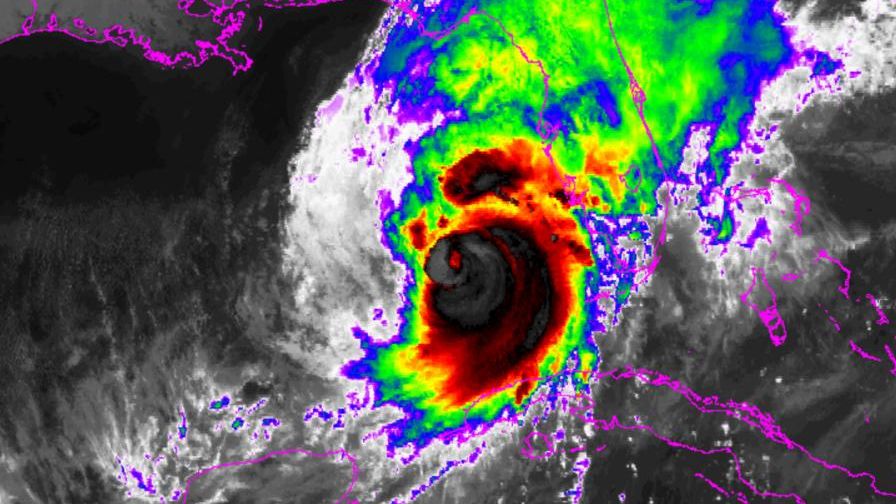
Major Category 4 Hurricane Milton on radar rapidly approaching Florida | NOAA/National Hurricane Center
Recently, our sister brand of Growing Produce (under the Meister Media Worldwide umbrella) covered the upcoming impact of Hurricane Milton on Florida growers, and how they’re preparing for its impact and aftermath. Here’s what they had to say:
The life of a Florida farmer comes with all the extras hurricane season can throw at them. Sometimes that includes dealing with multiple storms and their impacts. This hurricane season has delivered on that challenge. Less than two weeks after major Hurricane Helene struck, bringing widespread devastation, growers are now girding for another major strike — this time from Hurricane Milton. The projected path of Milton is taking it across higher population areas of the Sunshine State. Extreme impacts are expected. Among the wide swath are plenty of produce-growing operations. For those still in recovery mode from Helene, Milton will add salt to the wound. Heavy rain and wind are already encroaching well ahead of the main core’s landfall.
Florida’s main citrus production area was spared from Helene. Milton will be a different story. Given recent lessons learned the hard way from major hurricanes Irma (2017) and Ian (2022), Florida citrus growers know what to expect. “Florida citrus growers are preparing now for the severe impacts of Hurricane Milton,” says Matt Joyner, Executive VP and CEO of Florida Citrus Mutual. “While they can evacuate families and secure equipment, there is little we can do to prevent wind and floods from destroying groves.”
Ironically, the next USDA Citrus Production Forecast for the 2024-2025 season is scheduled to release later this week on Oct. 11. No doubt, the forthcoming estimates will be affected by Milton.
A statement from the Florida Fruit and Vegetable Association echoes that of Joyner.
“With Hurricane Milton set to cross the Florida Peninsula this week, fruit and vegetable growers across the state have been preparing their operations for potential impacts, and most importantly, ensuring the needs of their workforce and families are met. Once the storm passes, and it is safe to do so, growers will work quickly to recover and resume normal operations. As communities across Florida complete their final preparations before landfall, we are praying for everyone’s safety and are grateful for the critical steps our members and emergency response partners with the state of Florida have already taken and will continue to take, to protect our food supply.”
Florida Farm Bureau Federation advises farmers and ranchers to document their property with photos and/or video before the storm and to then do the same to document any damage sustained afterward.
The industry organization has created a Hurricane Milton Resource webpage that includes emergency declarations, truck weight/size waivers, critical access to agricultural facilities memos, and other key documents and information for the agriculture community.
Affected producers are encouraged to report agricultural loss through UF/IFAS’ Hurricane Milton Disaster Assessment Survey. The survey will help estimate the production losses to assist state and federal agencies in making informed decisions related to disaster response and relief.
Florida Farm Bureau’s main message for growers — its work will continue to advocate on their behalf not only for Milton but also for ongoing recovery from Helene.
“We have hosted roundtables and farm tours with decision-makers to ensure they are aware of agricultural damage. We will continue the momentum for Hurricane Milton. We understand that Florida’s farmers have suffered significant losses, and many are still recovering from Hurricanes Idalia, Debby, and most recently, Hurricane Helene. Hurricane Milton will be the 4th hurricane to strike the farming community in the last 14 months. Farmers and ranchers are already challenged with maintaining profitability to stay in production. Another hurricane will further compound the stressors our Florida farms face to produce the food and fiber that the nation depends on.”
While hurricane preparedness and recovery are nothing new for Florida, the fact doesn’t make it any easier. Joyner is confident the local agriculture community will endure. “Florida growers are resilient, and I know they will weather this storm, as they have done so for centuries.”
Other Important Hurricane Milton Info and Recovery Resources for Florida Growers
Proper preparations ahead of the storm can help streamline the recovery process afterward. Here are some key resources to consider:
- Agriculture and Aquaculture Producers Natural Disaster Recovery Loan Program: Eligible Florida farmers, ranchers, and growers impacted by hurricanes can apply for interest-free loans up to $500,000.
- USDA Disaster Assistance Program At a Glance
- Farm Loan Discovery Tool
- Farm Service Agency (FSA) Locator
- Insurance Agent Locator
- Noninsured Crop Disaster Assistance Program (NAP): USDA’s Farm Service Agency’s NAP provides financial assistance to producers of non-insurable crops when low yields, loss of inventory, or prevented planting occur due to natural disasters.
- Tree Assistance Program: The Tree Assistance Program (TAP) provides financial assistance to qualifying orchardists and nursery tree growers to replant or rehabilitate eligible trees, bushes, and vines damaged by natural disasters.
- USDA Environmental Quality Incentives Program: The Environmental Quality Incentives Program (EQIP) provides financial and technical assistance to agricultural producers and non-industrial forest managers to address natural resource concerns and deliver environmental benefits such as improved water and air quality, conserved ground and surface water, increased soil health and reduced soil erosion and sedimentation, improved or created wildlife habitat, and mitigation against drought and increasing weather volatility.
- UF/IFAS Disaster Work Log
Additionally, the Florida Farm Bureau opened its Hurricane Relief Fund for Agriculture to assist farmers and ranchers who have been impacted by the 2024 hurricanes. Anyone can make a tax-deductible contribution to this fund to support Florida’s farmers and ranchers.

